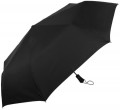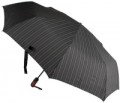Spoke material
The material from which the spokes of the umbrella are made. It may differ from the frame material (see the relevant paragraph), which is why this parameter is given separately.
—
Steel. One of the most common knitting needle materials. In modern umbrellas, different grades of steel can be used, differing in price and quality; usually, this moment directly depends on the price category of the umbrella. However, anyway, this material is strong enough, resilient, reliable and durable, and is relatively inexpensive. The main disadvantage of steel can be called a relatively large weight.
—
Aluminium. Compared to steel, aluminium is distinguished, on the one hand, by its lower weight, and, on the other hand, by its relatively low strength. As a result, it is relatively rare, mainly in children's umbrellas and low-cost "adult" models.
—
Fibreglass. A material based on a fibre of thin glass threads. Differs in rather high durability and reliability. However, the main advantage of this material can be called the ability to bend well without damage, which allows such knitting needles to normally endure turning the dome inside out. This is especially important for
storm umbrellas(see above), although it will be useful for a regular umbrella. However, such knitting needles are more expensive than the same steel ones.
...>
— Fibreglass. Composite material made of glass fibre filled with plastic. It is similar in properties to the fibreglass described above, however, on the one hand, it is cheaper, on the other hand, it is somewhat inferior to it in terms of performance, including the same flexibility.
— CFRP. Composite carbon fibre material with plastic filler. With a small weight, carbon fibre is highly durable, however, it also costs accordingly, which is why it is relatively rare.Dome diameter
The diameter of the umbrella dome when unfolded. The larger the diameter of the dome, the more reliably it will protect you from rain and the easier it will be to place one more person under the umbrella. On the other hand, a wide umbrella can be uncomfortable in tight spaces — for example, in the flow of pedestrians on a busy street — and when folded it will take up more space. Therefore, it does not always make sense to choose the largest of the available options.
The minimum diameter for an "adult" umbrella (see "Destination") is considered to be about 80 cm. Most models are in the range of 90 – 110 cm — this provides a good degree of protection with ease of movement. And in
the largest modern products, the diameter of the dome can reach 150 cm.
Length (folded)
The length of the umbrella when folded. For the decomposed one, this parameter is not specified, because is not critical, but when transporting a closed umbrella, it is the length that is the most important dimension.
The length of cane umbrellas (see "Type") is, by definition, the same when open or closed; most often it is 60 – 90% of the dome diameter (see above). But folding models of the same diameter can vary markedly in length, and here the choice depends on the situation: on the one hand, more compact umbrellas are more convenient to carry, on the other hand, they are less reliable and more complex in design, and also cost more.
Handle material
—
Plastic. As a material for umbrella handles, plastic is very practical: it has a low price, is resistant to moisture, and its strength, although lower than that of metals, is quite sufficient in this case, especially since there are many varieties of this material on the market, including number and are very durable. It is also worth noting the low thermal conductivity of plastic — it does not "cool" the hand in cool weather. Similar handles are used in umbrellas of all price categories.
—
Tree. Wood, like plastic, does not conduct heat well and does not cool the hand, while many consider it more pleasant to the touch; Yes, and this material looks quite stylish. At the same time, wooden handles are somewhat more expensive, and their quality noticeably depends on the price category of the umbrella (although in a cheap product, the frame is more likely to break than the handle).
—
Skin. In this case, of course, we are talking about a handle made of hard material (usually wood or plastic, see above), covered with genuine leather. Such a coating gives the pen a rich and solid appearance and well emphasizes the image of the owner — after all, leather is quite expensive. Of the practical disadvantages of this option, it is worth noting the exactingness of care — otherwise the material may lose its presentation.
—
Metal.
...Metal handles are usually an integral extension of the central rod. They are very durable, besides they look stylish, but they tend to "cool" the hand and slip out of it — therefore they are rarely used, mainly in designer models.
— EVA foam. Handles in the form of a solid base (usually the same material as the frame), covered with a layer of ethylene vinyl acetate (EVA) foam. This coating is pleasant to the touch, does not slip in the hand and provides a secure hold. At the same time, for a number of reasons, this option is found mainly in premium models.Handle shape
—
Hook. The characteristic curved handle allows you to hang the umbrella on any suitable device - the back of a chair, a clothes hanger, etc. In addition, it is quite secure when held and provides a stylish appearance with a hint of traditional classics. On the other hand, a hook makes the entire product more bulky and inconvenient to transport - therefore, it is found mainly among canes (see “Type”), where the main inconvenience is due to the size of the umbrella itself and depends little on the shape of the handle. Also, some believe that “hooks” are more likely to get lost than models with other types of handles; and this opinion is not without foundation - for example, there is a high probability of forgetting about such an umbrella hung by the handle in an inconspicuous place.
-
Direct. An elongated handle of a cylindrical (or close to it) shape; in some models it may be slightly bent - for example, to imitate the knob of a cane. Very comfortable to hold, but not as secure as a hook and less compact than a round one.
-
Round. This category includes handles that are close in shape to either a ball or a very short cylinder (the height of which is comparable to the diameter). This option is the most compact and is considered optimal for
folding umbrellas(see “Type”), created with ease of portability in mind. On the o
...ther hand, in terms of reliability and ease of holding, round handles are inferior to the types described above; This is partly compensated for by the wrist strap provided in many similar models.
- C-shaped. A rather unusual type of handle is in the form of a loop with a small slot resembling the letter C. The slot is provided so that the umbrella can be hung on a rope or other similar device. In any case, this form provides two advantages over more traditional options. Firstly, it provides more grip options - you can grab the bottom of the loop, the side, between them, etc. Secondly, it allows you to free your hands when holding an open umbrella: the C-shaped handle can be put on the wrist, and The central rod should be rested on the shoulder; as a result, the hand will be free. On the other hand, this type of handle is quite bulky and expensive; It is because of this that they have not gained much popularity.Weight
Total weight of the umbrella.
All other things being equal,
lighter umbrellas are more convenient to carry (both in the open and closed positions). On the other hand, such products are less reliable and/or more expensive than relatively heavy models of similar design and size. We also note that in some cases, significant weight can be an advantage. For example, in a strong wind, a massive umbrella does not “tear from your hands” as much, and when released, it does not fly as far as a lighter one.

